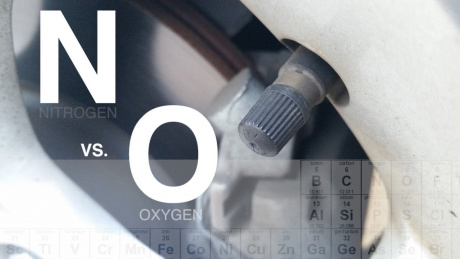
Nitrogen or oxygen in tires? This can be confusing at first. Insufficient air pressure in your vehicle's tire can damage your tires and even cause an accident on the road.
Nitrogen or oxygen? Which is better?
Well, automobile industry experts are optimistic about Nitrogen as a better choice for your tires than air. It's true: due to its slightly larger molecules, nitrogen has a worse diffusion coefficient than oxygen and therefore escapes a little more slowly from a tire. Let’s explore in more detail.
Nitrogen has larger molecules than oxygen
The rubber in tires has tiny, microscopic holes on its surface. This leads to an escape of molecules of any gas that is there in the tire. But, to take you back to one of your chemistry classes from high school, some gas molecules are larger than others. And the same applies to nitrogen vs. oxygen.
The molecules of nitrogen are bigger, so the rate of molecular escape is slower than oxygen. Thus, the retention of pressure in your tire will be longer with nitrogen.
Nitrogen doesn’t cause fire
Another argument in favor of nitrogen filling is the lower risk of fire. That is why the tires of commercial aircraft, Formula 1 cars, or even dangerous goods transporters are usually filled with nitrogen instead of air.
That makes sense because these tires are exposed to extreme loads and could start to burn in the event of extreme accelerations in the event of a defect or significantly insufficient air pressure.
However, nitrogen has the advantage that it is non-flammable and - hence the name "nitrogen" - even stifles fire. Oxygen, on the other hand, is the basis for every open flame, so it has a fire-accelerating effect.
Nitrogen is good for mileage
Another thing that also contributes to the cost-effectiveness is nitrogen's impact on mileage.
According to Environmental Protection Agency, with every drop of 1 psi, gas mileage drops by .03%. So, the more the pressure, the better the mileage. That is precisely what we call a win-win situation. You get better tires that run longer, you save money, and you protect the environment.
So, seal the deal with nitrogen. But be careful! More pressure doesn't mean that one over-inflates the tire because that could be dangerous.
Nitrogen offers better tire pressure monitoring
Better tires and Tire Pressure Monitoring System (TPMS) components are the main reason why you would want to go for nitrogen in your tires.
Moisture is one thing you want to look out for because it harms your tires and TPMS. It can crack rubber compounds, rust steel belts, and corrode metal components of the TPMS. Nitrogen in your tires also minimizes the risk of moisture which increases the lifespan of your tires and TPMS.
Nitrogen inflation is prevalent among race cars and airplanes because of its inertness towards variable factors like temperature, external pressure, and elevation.
Despite its multifold benefits, nitrogen is still not that common. It might seem complicated to find a station that refills your tires with nitrogen, but it’s worth researching.
Also, for brand new tires, the dealer might inflate your tires with nitrogen for free. You have to pay some amount when you want to do it again. It doesn't hurt to pay for something which yields more benefits than harm.
Go for nitrogen, you won't regret it.
Same articles

Understanding Vehicle Inspection and Verification Services: Why They Matter for Every Driver
GuidesVehicle inspection and verification services are an essential but often overlooked part of keeping roads safe and cars legally compliant. Most people only think about inspections when it’s...
KLIFEX Brand Overview: High-Quality Automotive Repair Kits for Affordable Repairs
GuidesThe automotive aftermarket has long needed solutions that combine reliability, durability, and affordability. Many car enthusiasts and services are looking for a way...
Fast, Reliable Vehicle Emissions & Inspection Services Made Simple
GuidesFast, reliable emissions and inspection services are essential for keeping vehicles road-ready, compliant with environmental regulations, and safe for daily driving. If you’re looking for quick...

